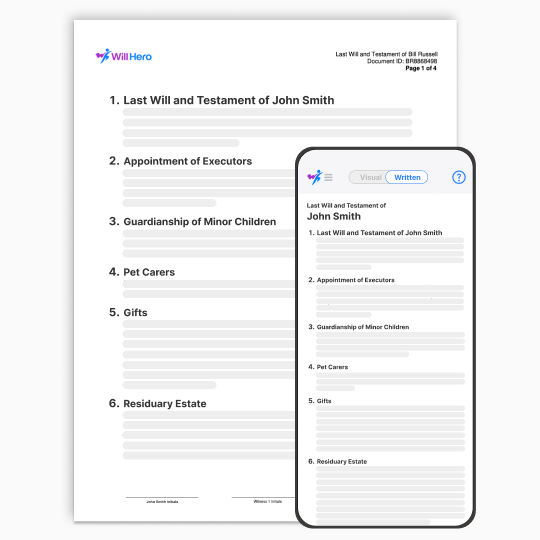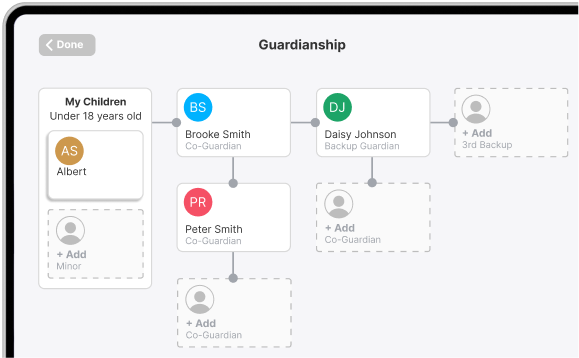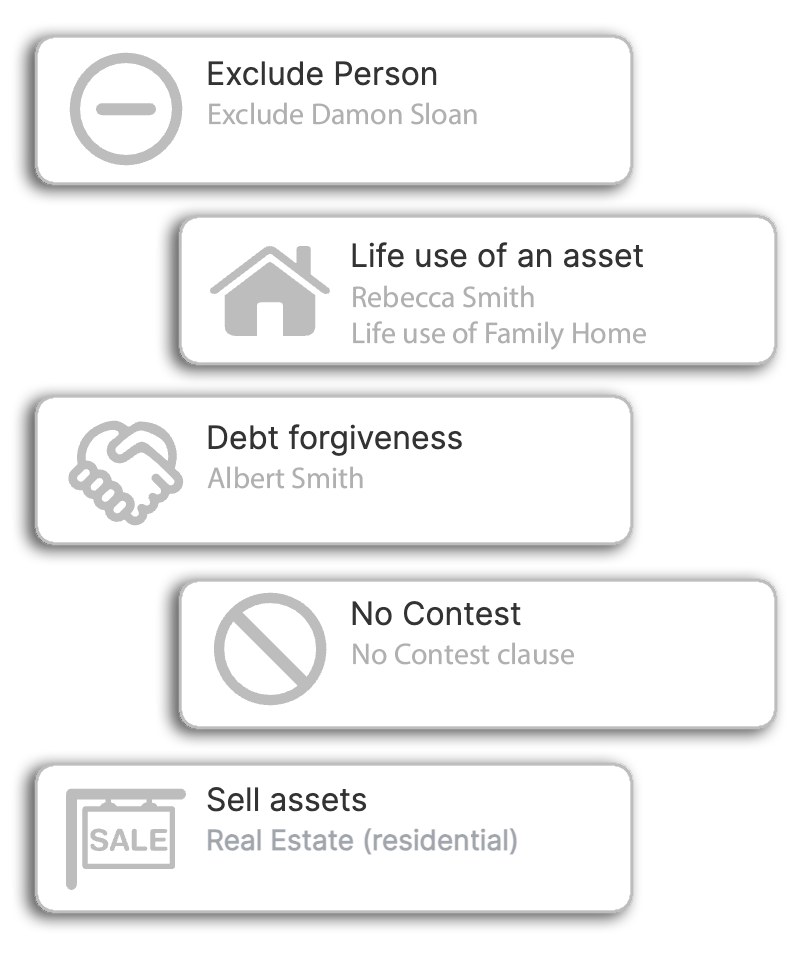
How To Make a Will in New York
A Step-By-Step Guide for creating a Last Will and Testament In New York
Introduction: What is a Will?
A will is an important document that outlines how your assets will be distributed after your death. It also helps make critical decisions regarding your family’s future. Beyond passing on assets like property and money, a will allows you to name guardians for your minor children, ensuring their well-being if something happens to you. Without a will, the state of New York will decide how your estate is divided, which may not align with your desires.

Laws for Creating a Will in New York
When making a will in New York, you must adhere to specific legal requirements. Failing to meet these criteria could result in your will being invalid, causing complications during probate. Below are the key legal requirements in New York:

You must be at least 18 years old.

You must be of sound mind:
This means you understand what a Will is, what your assets are, and how you are distributing them.

The Will must be in writing and signed by you and two witnesses:
Oral Wills are not recognized in New York, so your Will must be a physical document (either typed or handwritten). Your Will must be signed by you and two competent witnesses.
By following New York’s will laws, you can ensure your estate is distributed as you intend. If your will doesn’t meet these requirements, it may be contested or deemed invalid, potentially leaving the fate of your estate to the courts.
Step-by-Step:
How to Draft Your Will in New York
1. Choose an Executor
An executor is responsible for managing your estate and ensuring your wishes are carried out after your death. They will oversee the distribution of assets, pay any outstanding debts, and manage the legal processes involved in settling your estate.
When selecting an executor, consider someone organized, trustworthy, and capable of handling these responsibilities. Many people opt for a family member, close friend, or professional advisor.
It’s also wise to name a backup executor in case your first choice is unable or unwilling to serve.

2. Name a Guardian for Minor Children
If you have minor children, it’s important to name a guardian who will care for them if you pass away. This guardian will be responsible for making important decisions about their upbringing, including education, healthcare, and overall well-being.
Although optional, naming a guardian is an important step for parents. In New York, if you don’t designate one, the court will appoint a guardian, which may not reflect your preferences.
It’s recommended to name a backup guardian in case your first choice is unable or unwilling to serve.

3. Name a Pet Carer
New York law allows you to include provisions for your pets in your will. You can designate someone to care for them and allocate resources for their upkeep, ensuring your pets are well looked after when you’re no longer around.
While this step is optional, it’s an important consideration for pet owners. If you don’t name a pet caretaker or guardian in New York, this responsibility will fall to your executor, which may not reflect your preferences.

4. Decide who inherits your Residual Estate
The residuary estate consists of what remains after specific gifts and expenses have been deducted. You can designate one or more beneficiaries—such as family members, friends, or charitable organizations—to inherit these remaining assets. Be sure to list their full legal names and specify the exact share each should receive. It’s also a good practice to name backup beneficiaries in case your primary choices are unable to accept the inheritance, ensuring a smooth distribution of your estate.

5. Gifting Specific Items
If you have specific items—such as family heirlooms, jewelry, cash, or property—that you want to leave to particular individuals, you can specify them in your will. Be as detailed as possible to avoid confusion or disputes, including descriptions or appraisals where necessary. It’s a good idea to take an inventory of all your assets before drafting your will to ensure everything is accounted for and properly designated.

6. Any Additional Instructions or Provisions?
Including special instructions in your will is optional but can provide clarity. You might specify details such as your final resting place or include instructions to sell a particular asset. You can also make certain gifts conditional or set up a trust to hold funds until beneficiaries reach a specific age. These provisions help ensure that your wishes are carried out as you intend.

Review Your Will
Confirming Roles in Your Will
Before finalizing your will in New York, it’s important to confirm that your chosen executors, guardians, and pet caretakers are willing to take on their assigned roles. This ensures each person is prepared and agrees to fulfill their responsibilities, reducing potential issues during the execution of your will.
It’s best practice to confirm with both the primary and backup individuals in these roles to ensure they are willing to take on the responsibility:

Executors
Guardians
Pet Carers
Test Your Will
Before completing your will, it’s crucial to carefully review your wishes and consider various potential scenarios. Think about situations like beneficiaries passing away before you or conditions in the will not being met. Planning for these possibilities ensures your estate is distributed according to your intentions, even under unforeseen circumstances.

Signing Your Will
Signing Your Will In Front of Witnesses
Once your will is drafted, the next essential step is printing and signing it. In New York, specific legal requirements must be met for the will to be valid.
Witness Requirements
In New York, you must sign your will in the presence of at least two witnesses who must:
- Be at least 18 years old.
- Understand that they are witnessing the signing of your will.
While it’s recommended, witnesses are not legally required to be disinterested parties (they can be beneficiaries); however, this could complicate probate, so choosing non-beneficiaries is preferred.
Both witnesses must sign the will after you, attesting that they witnessed your signature and that you appeared to be of sound mind when signing.
Witnesses vs Notaries
A will does not need to be notarized to be legally binding in New York, but notarizing it can create a “self-proving” will. A self-proving will helps expedite probate, as the court can accept it as valid without requiring witnesses to testify. However, notarization is optional and not required by law.
Storing Your Will
Keep Your Will Safe
After your will has been signed and witnessed, it’s critical to store the original document securely. In New York, only the original signed copy is legally binding, not a digital version. Losing or damaging it could cause complications and delays in the distribution of your assets.
Options for securely storing your will:
Store at Home
In a fireproof safe, ensuring your executor knows its location.
With an Attorney
Your lawyer can store it in a secure location.
Trusted Person
You can also leave your will in the care of a trusted family member or friend, making sure they understand the importance of safeguarding the document.
Although you can store copies online for reference, only the original signed document is legally valid. Make sure your executor knows where to find it to avoid legal issues.
FAQs: New York's Wills
1. What Are My Options for Making a Will in New York?
In New York, you have several options for making a will:
- Using an Online Platform: For simpler estates, online will creation platforms like Will Hero provide an affordable, convenient option to create a legally valid will with a step-by-step guide.
- Hiring a Lawyer: For large or complex estates, or if you need personalized legal advice, hiring an attorney is often the best choice. They can assist with estate tax planning, trusts, and more.
-
Handwritten Will (Not Holographic): New York allows handwritten wills if they are signed and witnessed. However, holographic wills (handwritten without witnesses) are not recognized in New York except for military personnel or mariners, and can be easily contested.
2. Do I Need a Lawyer to Make a Will in New York?
No, hiring a lawyer is not required to create a valid will in New York. If your estate is simple and your wishes are straightforward, you can use an online platform or create a handwritten will, as long as it meets New York’s legal requirements. However, if your estate is complex or you have concerns about tax planning, trusts, or family dynamics, seeking legal advice can help ensure your will is comprehensive and properly executed.
3. Are Handwritten (Holographic) Wills Valid in New York?
No, handwritten wills, also known as holographic wills, are generally not valid in New York. The exception is for active-duty military personnel and mariners at sea under specific conditions. For a handwritten will to be legally valid in New York, it must be signed and witnessed by at least two people. Without proper witnesses, it will not be recognized by the courts.
4. How Much Is the Estate Tax in New York?
Estates valued over $6.58 million (as of 2023) may be subject to New York estate taxes. Additionally, the federal estate tax applies to estates exceeding the $12.92 million exemption threshold (as of 2023). If your estate exceeds these limits, it may be subject to both federal and state estate taxes. Consulting a tax professional or attorney is recommended to help with estate tax planning.
5. Do I Need to Notarize My Will in New York?
No, notarization is not required for a will to be legally valid in New York. You must have at least two witnesses present when you sign your will, and they must also sign it. However, notarizing your will can create a “self-proving” document, which may expedite the probate process by eliminating the need for witness testimony. While beneficial, notarization is not a legal requirement under New York law.
6. Can I Change My Will After It’s Signed?
Yes, you can update or change your will at any time, as long as you are of sound mind. There are two main ways to do this:
- Add a Codicil: A codicil is a legal amendment to your existing will. It must be signed and witnessed like the original will.
- Create a New Will: Draft a new will explicitly stating it revokes all prior wills and codicils. After signing, destroy all old copies to prevent confusion or disputes.
7. What Happens if I die without a Will?
If you die without a will in New York, your estate will be distributed according to the state’s intestate succession laws. This means your assets will go to your closest legal relatives, as determined by law. If no close relatives are found, the state may claim your property. Additionally, if you have minor children, the court will appoint a guardian, which may not align with your wishes. Creating a will allows you to make these important decisions yourself.
8. What is Probate?
Probate is the legal process to validate a will and ensure an estate is distributed according to the deceased’s wishes or state law if there’s no will.
In New York, probate generally involves these steps:
- Filing the Will: The will and a petition are submitted to the local probate court.
- Appointment of Executor: If no executor is named, the court will appoint one.
- Inventory of Assets: The executor identifies and values the estate.
- Paying Debts: All outstanding debts, taxes, and expenses must be paid.
- Distributing the Estate: Remaining assets go to beneficiaries or are distributed per intestate laws.
- Closing the Estate: A final petition is filed to close the estate.
9. How Long Does Probate Take?
10. Can Probate Be Avoided?
Some assets can bypass probate through mechanisms like:
- Joint ownership with right of survivorship: Property held in joint tenancy passes directly to the surviving owner.
- Beneficiary designations: Assets like life insurance, retirement accounts, and payable-on-death accounts with designated beneficiaries bypass probate.
- Living trusts: A living trust allows you to transfer ownership of your assets into the trust while you’re alive. The trust then holds those assets for your benefit during your lifetime and transfers them to your designated beneficiaries after your death. Since the assets are owned by the trust, not by you personally, they don’t need to go through probate. It’s important to ensure that your assets, such as real estate, bank accounts, and investments, are properly moved into the trust for this benefit to apply.
Ready to Start your Will?
Getting started is often the hardest part. Will Hero makes it easy to begin creating your will visually and understand your wishes with the help of guides and an AI Assistant. With a free account, you can even test your will under different scenarios using Scenario Testing. An upgrade is only required when you’re ready to finalize your document. Will Hero is on a mission to make will creation more visual, interactive, and approachable, turning a daunting task into something simpler and even fun.
However you wish to make your Will, get started today and protect your loved ones and your legacy.




